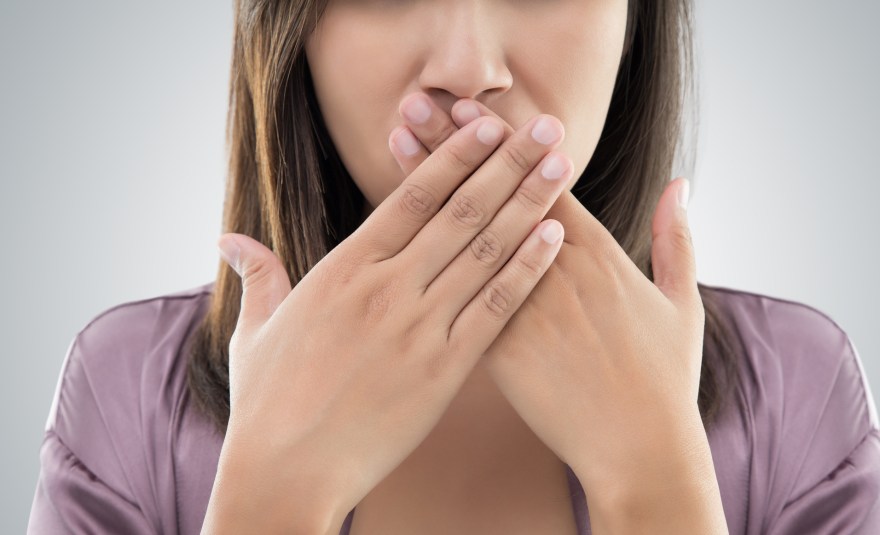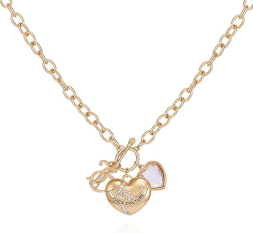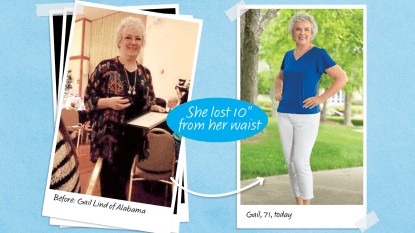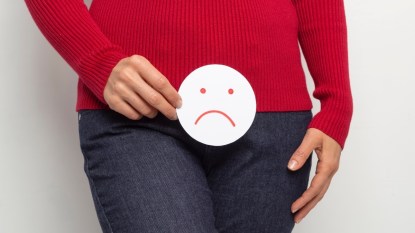Dealing With Halitosis? 5 Easy Ways To Get Rid of Bad Breath

Have you recently found yourself navigating the grocery store aisles, with your smile snuggly hidden behind your uncomfortable mask, thinking what is that awful smell? — only to realize that it is indeed, your own breath? Well, I have and I am most definitely embarrassed. But hey, this is a part of life — quarantined or not — and many people struggle with it. Luckily, there are many ways to get rid of bad breath.
While the causes of halitosis vary from diet (I recently started a Keto diet and learned that was the culprit of my not-so-fresh breath) to dehydration and poor dental hygiene. Rest assured, you are not alone and there are solutions aplenty. “Many are understandably worried and concerned about bad breath,” says Dr. Zachary E. Linhart, DDS of Linhart Dentisty. “We assure you it’s a super common occurrence and most often can be easily treated with proper oral hygiene and eating habits.”
While many dentists are currently seeing patients for emergencies only, it is more important than ever to practice good oral hygiene at home and treat bad breath with some tried and true remedies. Linhart offers the following tips:
Do a Smell Test
It isn’t always easy to recognize your own sour breath and it is certainly best to catch it before anyone else does. “The best trick for testing your breath is to rub your fingers on the back of your tongue (after washing your hands of course!),” says Linhart. “Then let your fingers dry and smell them. This is a much better test of bad breath than the old huff-huff into your hand, which usually does not work on yourself.” If you don’t want to do that, you can always ask a trusted friend or relative.
Stick to a Routine
Perhaps the most important step in the fight against bad breath (and all dental health issues) is to create and stick to a good routine of flossing, brushing, and rinsing. Yes, I know, we have heard it all before, but here’s an interesting take on the traditional lecture. “Don’t rinse off after brushing,” says Linhart. “The fluoride and other cavity-fighting ingredients from toothpaste should sit on your teeth overnight to help keep your teeth strong.”
Here is his personal brushing routine:
Morning
Brush (2mins)
Mouthwash (swish 30 secs)
Mid-Day
Brush again OR mouthwash
Night
Floss
Mouthwash (swish 30 secs)
Brush (2 mins)
Chew on This
If you are worried about bad breath when you’re out and about, Linhart recommends chewing on a parsley leaf or a lemon/orange peel. The chlorophyll in the parsley acts as a natural deodorizer and can help freshen breath temporarily. Lemon and orange peels contain citric acid, which will stimulate your salivary glands and in turn, fight dry mouth, which is often an underlying cause of halitosis. Of course, if packing a bag of lemon rinds and parsley leaves doesn’t fit with your lifestyle, you can always reach for the Listerine Strips ($3.99; Amazon).
Make a Rinse
Linhart says mouthwashes are great because they rinse food particles from inside your teeth after a meal, moisten your mouth (except for alcohol-based rinses, which can do the opposite), and have a minty or fresh flavor — all things that will help freshen your breath. A variety of specialty mouthwash products market themselves as fighting bad breath, so give them a try and see which ones work best for you.
He also suggests making your own lemon antiseptic mouthwash at home. Simply mix a tablespoon of lemon juice in a cup of water and gargle with it. But remember, lemons are acidic and overuse of this technique can cause enamel erosion. So, save this trick only for when it’s really needed. Other DIY mouthwashes include baking soda and water or hydrogen peroxide and water, both of which will help clear out debris and fight inflamed gums. If in doubt, check in with your dentist about what method is best for you.
Check Your Diet
Diet plays a key role in breath freshness, so be sure to avoid high-sugar foods and foods that are likely to get stuck in between your teeth, like dried fruits. “The constant stream of sugar feeds bacteria in [your] mouth and can lead to bad breath and cavities,” says Linhart. If you do indulge in something sugary, be sure to brush and floss immediately afterwards. It is also important to keep your mouth moist as some halitosis stems from dry mouth. “Drinking plenty of water and sucking on sugarless candies can help induce more saliva production.”













